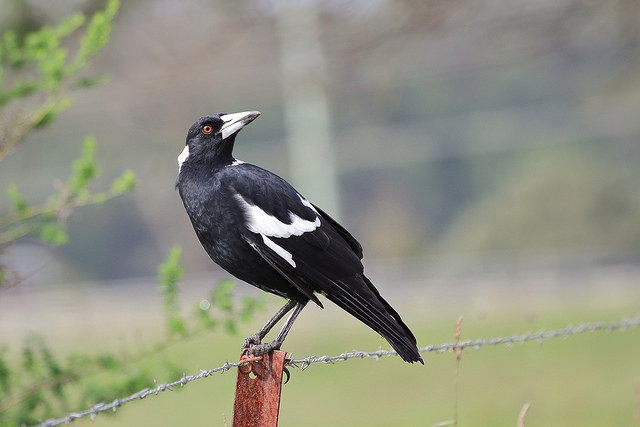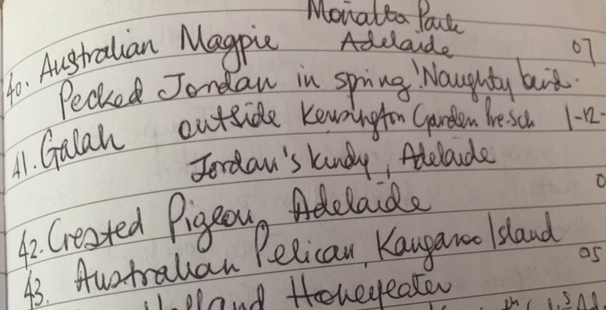
The first spring after we moved into our house in Adelaide, magpies swooped me occasionally, but I didn’t pay them much attention. Magpies are territorial birds, protective of their young in spring and will swoop to try to scare away perceived threats. The only real damage they can inflict on humans is eye injury, but I wear glasses so I am safe.
One quiet morning, I decide to go for a walk around my neighbourhood. On the bitumen outside my neighbour’s house, I notice a splatter of black and white feathers. A magpie chick must have been run over by a car. I step closer and bend down to get a better look. From behind, I hear powerful wingbeats approaching, fast.
I turn. A pair of crazed red eyes are fixed on me. A very sharp beak is coming straight at me. A scream of pure unadulterated terror pierces the air. It is my scream but I do not recognise my voice.

I stumble backwards. I push myself far back into a tree, as if the pine needles can offer protection against this bird that must think that I killed its baby. It has aborted its attack without touching me. Perched on a low branch, about five metres away, it does not take its eyes off me.
Finally, mercifully, it turns its head, slightly. Now, only one red eye is trained on me. Eventually, I find the courage to move. A small step first, then another, and slowly I crab walk back up the road, all the while I keeping both my eyes on the magpie and when it is out of sight, run like crazy the last few metres home.
Every breeding season since then, the magpies have targeted me with a vengeance. For most of the intervening seven years, the magpies have swooped only me and left all other family members and neighbours alone.
Every year, the first swoop of the season catches me unaware as I rush to complete as many gardening jobs as possible before I am banished indoors. Last year, I fell off a ladder while pruning a tall thorny rose bush. I screamed, dropped my tools, and ran. Thankfully, I was on a low rung of the ladder. This year, I was talking to my neighbour when it swooped. I stumbled, yelled out goodbye, and ran. We resumed our conversation a few days later, with me hiding beneath a huge black golf umbrella.
How I wish that I could communicate to the magpies that I am not a threat. The irony is that I love birds. I keep a bird list: over a hundred birds identified (caged birds not counted – twitchers’ rules). I put out water for birds in summer. I try to plant plants that provide food for them.

I have even tried, in non-breeding seasons, to feed the magpies – mince beef or bread – to persuade them of my essential goodness. On a few occasions, one has been persuaded to hop nearer, and nearer, and finally to pick up the piece of bread and fly away. But then, spring comes, protective instincts kick in, and all goodwill is lost.
When my efforts failed, the question became: how long do magpies live? When this lot dies off, my life can return to normal again – collect the mail, smell the roses, talk to the neighbours.
But then I heard on a radio program that magpies teach their young to target the same people they perceive as dangerous. It’s intergenerational!

It made me think about the information that is passed down to us. How much of it is misinformation? When I was about ten years old, my grandmother died. I remember being driven to the place where she would be laid to rest. In the car, with my cousins, I was told that on no account should I look back, otherwise something very bad will happen. I had every intention of obeying, but became distracted, and looked back. There was a collective gasp of horror from my cousins. They wagged accusatory fingers, but, thankfully, nothing bad happened.
Other types of misinformation can have more dire consequences. Sometimes people take one incident, that happened at a point in time, under specific circumstances and generalise it to represent a whole group of people, for all time. Politicians may encourage certain narratives because it suits their interests. We have many terms for this: propaganda, bias, prejudice, fake news.
But I thought I couldn’t end this post on such a defeatist tone and last night improvised a magpie-proof hat.
I tested it for one hour, and am happy to say that from this limited test period, it appears to have worked. Either the magpies are not around (I am so traumatised that I think of them as omnipresent) or they cannot identify me or the wire ties have discouraged them from swooping. Finally, I got a gardening job done, a job that was really irking me.
Do you have a story about discovering that something that you had been told is untrue? Would love to hear about it in the comments below. More and more I think it is the sharing of our our first-hand experiences that is the antidote to fake news.
Please like and share if you enjoyed this story.
Next Friday, I will write about my experience of the Australian education system as a former international student, a former vocational teacher, and a mother (you never stop being a mother, so no former there).







Sometimes other people make negative comments about us. It can be hard to emerge from the belief that these remarks define who we are.
LikeLiked by 1 person
So true, Julia. I think I’m still trying to rid myself of some of those comments, comments so insidious that they pop up and surprise me with their power years later. I think the key is to replace lies with truths that build us up, rather than pull us down.
LikeLiked by 1 person
What a great read, MayKuan. We used to have the magpies in our neighbourhood swoop. But we learnt that they can adopt us if we don’t offer a threat to their younguns. Now, they have formed such a relationship with my husband, that they ‘tell’ him where to dig, then sit close-by so they can pick up the worms and transport them to their nests. I do hope you find a solution and that it can become a reasonable relationship.
LikeLike
What a lovely picture of partnership between your husband and the magpies. After reading your comment, I realize that I must view my improvised hat as a temporary measure and continue trying to restore trust 🙂
LikeLike
What an excellent read! Unfortunately, no magpies around my neighborhood. Just a small nest of wasp outside my kitchen window. Occasionally a few would find their way into my house and that would be the death of me. Would i think of gaining their trust.. no sir!.. now where’s my can of Bayer spray ???
LikeLiked by 1 person
Dear Sharon, I would do exactly the same if I were in your house. While magpies have some redeeming qualities e.g. beautiful singing voices and being friendly to some humans, I can think of no redeeming qualities to wasps. I’m sure an entomologist would be happy to correct me on that point 🙂
LikeLike
Thanks for a beautifully written, captivating post. I hope you don’t give up on those magpies! The length of time it takes makes the victory all the more sweet.
When I was 9, I had a relative tell me my parents would die young because they went to bed late. I lived waiting for it to happen and thankfully it didn’t.
LikeLiked by 1 person
Jenny, I will remember your comment all through next autumn and winter as I try to befriend the magpies.
Phew! So happy your parents didn’t die young. So many of us would be in trouble if that statement were true 🙂
LikeLike